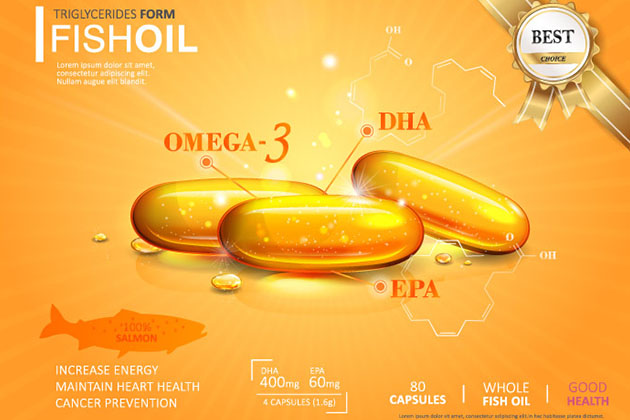Utafiti wa kina unaonyesha kuwa virutubisho vya Omega-3 vinaweza kutotoa faida kwa moyo
Inaaminika kuwa sehemu ndogo za omega-3 - aina ya mafuta - inaweza kuwa nzuri kwa afya ya mtu. Asidi ya alphalinolenic (ALA), asidi ya eicosapentaenoic (EPA), na asidi ya docosahexaenoic (DHA) ni aina tatu kuu za asidi ya mafuta ya omega-3. Haya yanaweza kupatikana katika vyakula ambavyo tunakula kila siku mfano vyakula vya mimea kama karanga na mbegu vina ALA na samaki wenye mafuta mengi kama lax au tuna na mafuta ya samaki yana EPA na DHA. Ni imani inayokubalika na watu wengi au tuseme 'ukweli' unaotokana na majaribio ya awali ya kimatibabu katika miaka ya 1980 na 1990 kwamba ulaji wa mafuta ya omega-3 unaweza kutoa kinga dhidi ya ugonjwa huo. moyo related diseases like moyo attack, stroke or death by lowering blood pressure or reducing cholesterol levels. Omega-3 virutubisho kwa namna ya vidonge vinapatikana kwenye kaunta na hutumiwa na watu wengi kila siku na au bila agizo la daktari.
Uchambuzi wa meta - mchanganyiko wa majaribio mengi
A recent Cochrane systematic review shows that omega-3 supplements have very slight or no effect on one’s risk of moyo diseases based upon a comprehensive review of evidence. Cochrane organisation is a global network of experts dedicated to informing health policy. For this study, a total of 79 randomized trials were conducted with 112,059 people to evaluate the effects of taking omega-3 fat on moyo circulation and diseases. 25 studies were designed and conducted and participants were from North America, Australia, Europe and Asia. Both men and women either healthy or having minor or major illnesses were included as participants. Randomly chosen, each participant had to either maintain their diet or along with diet take omega-3 fat supplement in the form of a daily capsule for one year. The meta-analysis assessed daily intake of omega-3 fat and few studies assessed intake of oily fish like salmon and tuna or ALA-rich foods while other participants were asked to maintain usual intake of food.
Virutubisho vya Omega-3 havina athari kubwa
Researchers concluded after evaluating the outcomes that there was evidence of high certainty that omega-3 had slight or no impact on a person’s risk of moyo attacks, strokes or heart irregularities. Also, omega-3 has ‘no considerable effect’ on risk of death as it was calculated at 8.8% for participants who took supplements, while 9% for controlled group who took normal food and did not take supplements. Omega 3 supplements had no effect on risk of cardiovascular events like stroke etc. EPA and DHA- the long chain omega-3 fatty acids – reduced some blood fat, triglycerides (which could be indicative of protection from heart diseases) and HDL cholesterol but then reducing HDL had an opposite effect.
There was ‘moderate evidence’ that consuming more ALA from supplemented walnuts may have small benefit on risk of main cardiovascular events or body weight seeing that risk of irregularities in the moyo was reduced from 3.3 to 2.6 %. Consumption of canola oil and nuts was seen of a small benefit especially in preventing heart arrhythmias. No evidence was collected on benefits of eating more oily fish and not much information could be collected on adverse scenarios like bleeding or blood clots from ALA. From extensive information collected from the 25 studies, no clear-cut protective effects of omega-3 were seen. The overall chance of receiving any benefits from omega-3 supplements was stated as one in 1,000.
Lishe yenye afya ni muhimu zaidi
The popular and widely accepted belief that EPA and DHA omega-3 supplements protect the moyo has been cited as controversial and is still debatable. Many experts believe that it is anyway very unlikely that one particular element of diet could be alone responsible for reducing risk of moyo diseases. The financial aspect of consuming supplements is also side-lined and it would rather be recommended to have an overall healthy diet and stop unnecessary use of over-the-counter supplements. However, if omega-3 supplements have been advised by the doctor for some specific reason then one must continue their intake. Otherwise the best recommendation to get omega-3 through natural foods rather than supplements
This meta-analysis is seen as a dependable comprehensive systematic review which has collected information spanned over long time durations from large groups of people providing strong evidences and has concluded that increasing intake of omega-3 fats may not be protective of our mioyo. Only ALA which is actually an essential fatty acid, is said to be an important part of a balanced diet and its increased intake can be somewhat useful for preventing and maybe treating cardiovascular events. This review conducted by Cochrane organisation was requested by World Health Organization who are in the process of updating their guidelines on polyunsaturated fats.
***
{Unaweza kusoma karatasi asili ya utafiti kwa kubofya kiungo cha DOI kilichotolewa hapa chini katika orodha ya (vyanzo) vilivyotajwa}
Chanzo (s)
Abdelhamid AS et al. 2018. Omega-3 fatty asidi kwa ajili ya kuzuia msingi na sekondari ya ugonjwa wa moyo na mishipa. Cochrane Database wa mapitio. https://doi.org//10.1002/14651858.CD003177.pub4
***






































